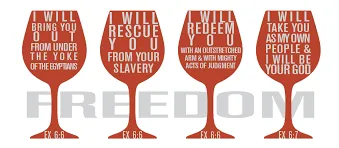Why Do We Drink Four Cups of Wine?

Participant:
Tonight we are commanded to drink four cups of wine. Four is an important number in the Seder: four cups, four children, four questions, and four matriarchs in the "Who Knows One?" song. Four is an important number in Jewish thought as well: the four corners (arbah kanfot) of the talit and the four kinds of fruit from goodly trees for Sukkot.
There are many explanations offered for the custom of drinking four cups of wine. Some say they represent:
- the four corners (arbah kanfot) of the talit, four corners of the world or the four compass points for freedom must reign everywhere
- the four seasons of the year, for freedom must be guarded at all times
- the four sides of a square, suggesting that only freedom brings completeness
The four cups of wine are also structurally connected to four verbal performances this evening:
- Kiddush, sanctifying the holiday
- Maggid, the storytelling
- Birkat HaMazon, completing the Pesach meal; and
- Hallel, completing the festival Psalms.
Participant:
Two 16th century Kabbalist rabbis offer a different explanation, identifying the Four Cups with the Four Matriarchs of Israel. The Maharal of Prague (famous for the legend of Golem) and Rav Isaiah Horowitz of Tsfat explain:
- The Cup of Kiddush stands for Sarah who was the mother of a community of converts, believers by choice.
- The Cup of Maggid is for Rebecca who knew how to mother both Esav and Jacob, two opposed natures.
- The Cup of the Blessing after Eating represents Rachel whose son Joseph provided the whole family of Jacob with bread in a time of great famine.
- The Cup of Hallel (Praise) is for Leah who came to realize that the pursuit of the impossible, Jacob's love, must give way to appreciation of what one has. When her fourth child was born, Judah, she praised God: " This time I will thank God " (Genesis 29:35).
Participant:
Above all, the four cups are traditionally believed to represent the four promises that G-d made to the Israelites (Exodus 6:6-7):
- Ve-ho-tzei-ti , I WILL BRING YOU OUT
- Ve-hi-Tzal-ti, I WILL DELIVER YOU
- Ve-ga-al-ti , I WILL REDEEM YOU
- Ve-la-kach-ti, I WILL TAKE YOU TO BE MY PEOPLE
While on the surface each promise seems to mean the same thing, the subtle differences in language are reminiscent of Maslow's Hierarchy of Needs and the Israelites readiness to embrace the responsibilities that come with freedom. According to Maslow, basic physiological needs required for survival, air, food, water, clothing, shelter and sleep, must be met before one is able to meet the higher needs for safety and security; love, belonging and acceptance; respect, recognition, sense of accomplishment and self-worth; and finally self-actualization.
- Ve-ho-tzei-ti , I will bring you out from under the burdens of Mitzrayim, indicates the first step of G-d was to physically free the Israelites from the Land of Mitzrayim and the physical labors and hardships imposed upon them by the burden of slavery.
- Ve-hi-Tzal-ti , "I will deliver you from their bondage," indicates deliverance from the psychological bondage experienced as slaves. Even after being physically freed, the Israelites would have still had the mind-set of slaves and needed to understand that they were now safe and secure.
- Ve-ga-al-ti , "I will redeem you with an outstretched arm and with great judgments," conjurs an image of both strenght and protection. When the people are redeemed, they will also be able to think of themselves as free and will no longer have to be passive and obey their masters. Only a free person can think of higher needs such as belongingness, love and self-worth.
- Ve-la-kackh-ti , "I will take you to Me for a people, and I will be to you a G-d," foreshadows the giving of the Torah on Mount Sinai and the Israelite's spiritual redemption and fulfillment.
Participant:
G-d also makes a fifth promise: Ve-he-vei-ti ; I shall bring you to the land, but this promise had not yet been fulfilled when our Ancestors left Mitzrayim. The debate over whether this fifth promise should be celebrated by a cup of its own led to the decision to leave the answer to Elijah, herald of the messianic coming. Hence, the custom of Elijah's cup and the messianic fifth cup.
We are about to partake of the first cup of wine, commemorating G-d's promise, "I will bring you out from under the burdens of Mitzrayim."
Inspired to create
your own Haggadah?
Make your own Haggadah and share with other Seder lovers around the world
Have an idea
for a clip?
People like you bring their creativity to Haggadot.com when they share their ideas in a clip
Support Us
with your donation
Help us build moments of meaning and connection through
home-based Jewish rituals.
OUR TOP CONTRIBUTORS
Passover Guide
Hosting your first Passover Seder? Not sure what food to serve? Curious to
know more about the holiday? Explore our Passover 101 Guide for answers
to all of your questions.






















